|
|
|
Sort Order |
|
|
|
Items / Page
|
|
|
|
|
|
|
| Srl | Item |
| 1 |
ID:
130956


|
|
|
|
|
| Publication |
2014.
|
| Summary/Abstract |
In July 2013 the UK's coalition government published "The Civil Service Reform Plan - One Year on", reporting on progress against minister Frances Maude's objectives to shake up the civil service. This followed various reported disagreements between ministers and civil servants over policy implementation, and a research report commissioned by the government from think tank IPPR into lessons from overseas for civil service reform. This trio of short articles reviews the government's proposals from three perspectives: that of the lead author of the IPPR report, a former senior civil servant, and the chair of the House of Commons Public Administration Committee (PASC) which oversees the civil service. The authors take differing views on the proposals, which include introduction of 'extended ministerial offices', and greater control by ministers over choosing their civil servants. Should these be seen as useful next steps, worrying developments, and/or large and important enough to merit a Commission on the civil service, as PASC has suggested?
|
|
|
|
|
|
|
|
|
|
|
|
|
|
|
|
| 2 |
ID:
165593
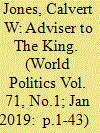

|
|
|
|
|
| Summary/Abstract |
Do experts rationalize and legitimize authoritarian governance? Although research on expert actors in contexts of democracy and international governance is now extensive, scholarly work on their role in authoritarian settings remains limited. This article helps open the black box of authoritarian decision-making by investigating expert advisers in the Arab Gulf monarchies, where ruling elites have enlisted them from top universities and global consulting firms. Qualitative fieldwork combined with three experiments casts doubt on both the rationalization and legitimacy hypotheses and also generates new insights surrounding unintended consequences. On rationalization, the evidence suggests that experts contribute to perverse cycles of overconfidence among authoritarian ruling elites, thereby enabling a belief in state-building shortcuts. On legitimacy, the experiments demonstrate a backfire effect, with experts reducing public support for reform. The author makes theoretical contributions by suggesting important and heretofore unrecognized conflicts and trade-offs across experts’ potential for rationalizing vis-à-vis legitimizing.
|
|
|
|
|
|
|
|
|
|
|
|
|
|
|
|
| 3 |
ID:
139247


|
|
|
|
|
| Summary/Abstract |
The settlers constitute a minority group whose goals are becoming increasingly unpopular among Israelis. As a result, the degree of legitimacy granted to them by the government gradually eroded over the years. However, their project still thrives. Their impressive success can be attributed to their focus on the bureaucracy. As early as the 1960s, the settlers engaged in a constant effort to identify actors in state and semi-state agencies that had common interests with them. At first they mobilized supporters from within those agencies. Later they made any effort to fill available positions with their own people. Today, the settlers' movement in Israel has fused itself with the relevant elements within the bureaucracy to a degree that many state agencies serve as extensions of the settler movement.
|
|
|
|
|
|
|
|
|
|
|
|
|
|
|
|
| 4 |
ID:
031949
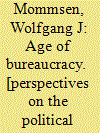

|
|
|
|
|
| Publication |
Oxford, Basil Blackwell, 1974.
|
| Description |
xvi, 124p.
|
| Series |
Explorations in interpretative sociology
|
| Standard Number |
0631151702
|
|
|
|
|
|
|
|
|
|
|
|
Copies: C:1/I:0,R:0,Q:0
Circulation
| Accession# | Call# | Current Location | Status | Policy | Location |
| 014932 | 306.3/MOM 014932 | Main | On Shelf | General | |
|
|
|
|
| 5 |
ID:
133658
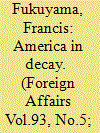

|
|
|
|
|
| Publication |
2014.
|
| Summary/Abstract |
The problems with American politics today stem from the basic design of U.S. political institutions, exacerbated by increasingly hostile polarization. Unfortunately, absent some sort of major external shock, the decay is likely to continue for the foreseeable future.
The creation of the U.S. Forest Service at the turn of the twentieth century was the premier example of American state building during the Progressive Era. Prior to the passage of the Pendleton Act in 1883, public offices in the United States had been allocated by political parties on the basis of patronage. The Forest Service, in contrast, was the prototype of a new model of merit-based bureaucracy. It was staffed with university-educated agronomists and foresters chosen on the basis of competence and technical expertise, and its defining struggle was the successful effort by its initial leader, Gifford Pinchot, to secure bureaucratic autonomy and escape routine interference by Congress. At the time, the idea that forestry professionals, rather than politicians, should manage public lands and handle the department's staffing was revolutionary, but it was vindicated by the service's impressive performance. Several major academic studies have treated its early decades as a classic case of successful public administration.
|
|
|
|
|
|
|
|
|
|
|
|
|
|
|
|
| 6 |
ID:
128500
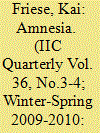

|
|
|
| 7 |
ID:
181928
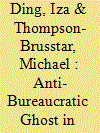

|
|
|
|
|
| Summary/Abstract |
The Chinese Communist Party's (CCP) ideology, rooted in its foundational struggles, explicitly denounces “bureaucratism” (guanliaozhuyi) as an intrinsic ailment of bureaucracy. Yet while the revolutionary Party has blasted bureaucratism, its revolutionary regime has had to find a way to coexist with bureaucracy, which is a requisite for effective governance. An anti-bureaucratic ghost thus dwells in the machinery of China's bureaucratic state. We analyse the CCP's anti-bureaucratism through two steps. First, we perform a historical analysis of the Party's anti-bureaucratic ideology, teasing out its substance and emphasizing its roots in and departures from European Marxism and Leninism. Second, we trace both the continuity and evolution in the Party's anti-bureaucratic rhetoric, taking an interactive approach that combines close reading with computational analysis of the entire corpus of the People's Daily (1947–2020). We find striking endurance as well as subtle shifts in the substance of the CCP's anti-bureaucratic ideology. We show that bureaucratism is an umbrella term that expresses the revolutionary Party's anxiety about losing its popular legitimacy. Yet the substance of the Party's concern evolved from commandism and revisionism under Mao, to corruption and formalism during reform. The Party's ongoing critiques of bureaucratism and formalism unfold in parallel fashion with its efforts to standardize, regularize and institutionalize the state.
|
|
|
|
|
|
|
|
|
|
|
|
|
|
|
|
| 8 |
ID:
168833


|
|
|
|
|
| Summary/Abstract |
Based on an ethnographic case study of an Islamic university in Russia, I examine how the state-implemented and bureaucratized traditionalization of Islam in Russia affects the everyday life of Central Asian students and how this project ‘from above’ is entangled with their coping strategies. I show how religious education has become a resource for the state as well as for young students and their parents. The Russian state uses these official religious institutions to control the Muslim population by creating and promoting a state-approved version of ‘traditional Islam’ and producing official religious specialists. For the young Muslim students, however, Islamic education provides, in addition to religious knowledge, access to networks, social security and new economic opportunities. It thereby offers a way to cope with the uncertainty caused by high unemployment rates and other socio-economic difficulties among young people.
|
|
|
|
|
|
|
|
|
|
|
|
|
|
|
|
| 9 |
ID:
178184
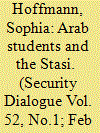

|
|
|
|
|
| Summary/Abstract |
In the early 1980s, the East German Ministry for State Security systematically recruited Arab students as covert informers. Analysis of this historical case contributes to discussions about surveillance as a social practice and to an emerging critical literature about intelligence agencies as knowledge producers and agents of governance. Proceeding from a close reading of archives documenting the recruitment process, I argue that it produced, first, classic modern bureaucratic security mechanisms designed to govern populations and, second, highly specific sovereign interventions into the lives of single individuals. By focusing primarily on the agents of surveillance, rather than its objects, the article addresses an important gap in the surveillance literature.
|
|
|
|
|
|
|
|
|
|
|
|
|
|
|
|
| 10 |
ID:
037059


|
|
|
|
|
| Publication |
Baltimore, Johns Hopkins University Press, 1978.
|
| Description |
xiii, 216p.
|
| Standard Number |
080182205X
|
|
|
|
|
|
|
|
|
|
|
|
Copies: C:1/I:0,R:0,Q:0
Circulation
| Accession# | Call# | Current Location | Status | Policy | Location |
| 019117 | 355/BER 019117 | Main | On Shelf | General | |
|
|
|
|
| 11 |
ID:
116224
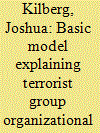

|
|
|
|
|
| Publication |
2012.
|
| Summary/Abstract |
Terrorist groups strive to balance efficiency with their need for security. This article examines the factors that affect a group's choice of organizational structure. I classify 254 groups from the Global Terrorism Database into one of four basic structures: market, all-channel, hub-spoke, or bureaucracy. The results of a multinomial logistic regression reveal that as secret organizations, terrorist groups are not just driven by achieving efficiencies in their organization but rather by protecting against infiltration and threats. Internal factors such as target selection, operational pace, ideology, and stated goals shape a group's structure. External environmental factors such as political rights, civil liberties, polity durability, and state wealth also help shape a group's structure.
|
|
|
|
|
|
|
|
|
|
|
|
|
|
|
|
| 12 |
ID:
185581
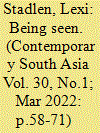

|
|
|
|
|
| Summary/Abstract |
Through an ethnographic focus on a Muslim village in rural West Bengal, this article explores how a group of women have come to defy gendered socio-cultural and locally rooted religious interpretations to become the bureaucratic and political gatekeepers within their community. The wider climate for Muslim men at this moment across India, the characteristics of bureaucratic spaces themselves and the perceived necessity of this kind of work for the most marginal are all identified as facilitating this shift. Yet in addition to these factors, this article will claim that the women themselves are wilfully utilising these encounters in order to become seen by the organs and actors of the local Indian state. It is not simple recognition they are after, nor to be considered as bureaucratic or political insiders, but rather to be seen on their own terms in diverse and context dependant ways that are ultimately of their choosing. As such, this shorkārī kāj or political work has become a central part of their daily lives and identities, to which it is suggested that their attributes and experiences as women may make them particularly well suited.
|
|
|
|
|
|
|
|
|
|
|
|
|
|
|
|
| 13 |
ID:
109881
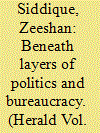

|
|
|
| 14 |
ID:
127940
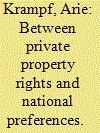

|
|
|
|
|
| Publication |
2014.
|
| Summary/Abstract |
The history of the Bank of Israel is often told as a story that leads from servitude to independence. According to this conception, the bank was a weak and marginal institution during the developmental period of the state, and it turned into an independent actor in the neoliberal period. This article argues that the portrayal of the bank as marginal during the developing period fails to recognize the essential role it played in contributing to the capacity of the state to allocate credit more effectively. It maintains that that Bank of Israel provided the state with market compatible instruments in order to govern the banking system and depoliticized the allocation of credit. The establishment of the bank had two effects on Israel's political economy: it enabled the government to weaken its dependence on the Histadrut as an agent of development and it allowed it to nurture linkages with the private sector.
|
|
|
|
|
|
|
|
|
|
|
|
|
|
|
|
| 15 |
ID:
001229
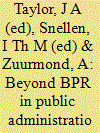

|
|
|
|
|
| Publication |
Amsterdam, IOS Press, 1997.
|
| Description |
xx,258p.
|
| Standard Number |
9051993099
|
|
|
|
|
|
|
|
|
|
|
|
Copies: C:1/I:0,R:0,Q:0
Circulation
| Accession# | Call# | Current Location | Status | Policy | Location |
| 040740 | 350/TAY 040740 | Main | On Shelf | General | |
|
|
|
|
| 16 |
ID:
045254
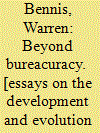

|
|
|
|
|
| Publication |
NewYork, McGraw-Hill Book Company, 1966.
|
| Description |
xiii, 223p
|
| Standard Number |
07004760X
|
|
|
|
|
|
|
|
|
|
|
|
Copies: C:1/I:0,R:0,Q:0
Circulation
| Accession# | Call# | Current Location | Status | Policy | Location |
| 013418 | 306/BEN 013418 | Main | On Shelf | General | |
|
|
|
|
| 17 |
ID:
132333
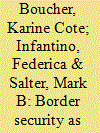

|
|
|
|
|
| Summary/Abstract |
The ambition of this special issue is to contribute to contemporary scholarly analyses of border security by bringing more focus onto a specific field of inquiry: the practices of the plurality of power-brokers involved in the securing of borders. Border security is addressed from the angle of the everyday practices of those who are appointed to carry it out; considering border security as practice is essential for shedding light on contemporary problematizations of security. Underscoring the methodological specificity of fieldwork research, we call for a better grounding of scholarship within the specific agencies intervening in bordering spaces in order to provide detailed analyses of the contextualized practices of security actors.
|
|
|
|
|
|
|
|
|
|
|
|
|
|
|
|
| 18 |
ID:
132334
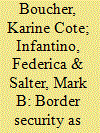

|
|
|
|
|
| Publication |
2014.
|
| Summary/Abstract |
The ambition of this special issue is to contribute to contemporary scholarly analyses of border security by bringing more focus onto a specific field of inquiry: the practices of the plurality of power-brokers involved in the securing of borders. Border security is addressed from the angle of the everyday practices of those who are appointed to carry it out; considering border security as practice is essential for shedding light on contemporary problematizations of security. Underscoring the methodological specificity of fieldwork research, we call for a better grounding of scholarship within the specific agencies intervening in bordering spaces in order to provide detailed analyses of the contextualized practices of security actors.
|
|
|
|
|
|
|
|
|
|
|
|
|
|
|
|
| 19 |
ID:
159724
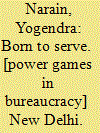

|
|
|
|
|
| Publication |
New Delhi, Manas Publications, 2017.
|
| Description |
263p.hbk
|
| Standard Number |
9788170495277
|
|
|
|
|
|
|
|
|
|
|
|
Copies: C:1/I:0,R:0,Q:0
Circulation
| Accession# | Call# | Current Location | Status | Policy | Location |
| 059438 | 923.5/NAR 059438 | Main | On Shelf | General | |
|
|
|
|
| 20 |
ID:
139903
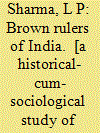

|
|
|
|
|
| Publication |
DelhI, Konark Publishers Pvt Ltd., 1988.
|
| Description |
xii, 154p.hbk
|
| Standard Number |
8122000770
|
|
|
|
|
|
|
|
|
|
|
|
Copies: C:1/I:0,R:0,Q:0
Circulation
| Accession# | Call# | Current Location | Status | Policy | Location |
| 029268 | 954.04/SHA 029268 | Main | On Shelf | General | |
|
|
|
|
|
|
|
|
|